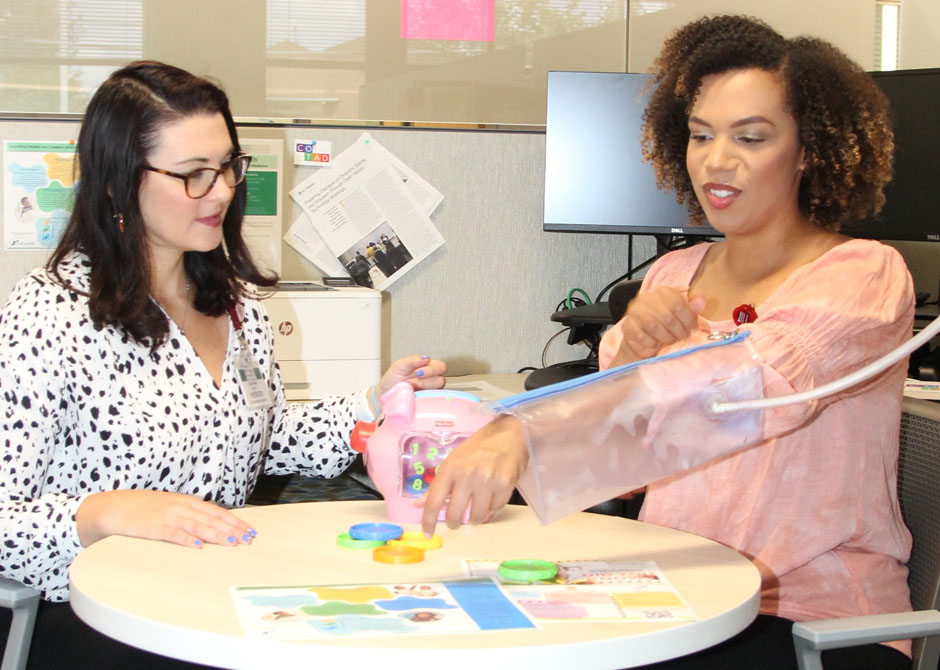Rehabilitation and Participation Science
Program in Occupational Therapy
by Michele Berhorst • September 15, 2021

Catherine Hoyt, PhD, OTD, OTR/L (left), and Maribeth Clifton, OTD, OTR/L (right), discuss using air splints for the I-ACQUIRE study.
In the lab space at 4480 Clayton Avenue, Catherine Hoyt, PhD, OTD, OTR/L, and Maribeth Clifton, OTD, OTR/L, prepare to participate in a multi-site Phase III clinical trial called I-ACQUIRE. In this case, that preparation involves practicing using toys therapeutically for infants and toddlers who have experienced perinatal article stroke (PAS). The study aims to determine the efficacy of constraint-induced movement therapy (CIMT) for children between 8 and 36 months of age. Hoyt serves at the site’s co-principal investigator.
“Children experience PAS through an injury to the brain due to lack of oxygen. This can cause hemiparesis, where one side of the body does not move as well as the other, and can severely limit a child’s ability to engage in the world around them. The outcomes vary depending on the stroke’s severity and where in the brain it occurred,” Hoyt explains. “The first few years are so critical for intervention because as children begin developing motor skills, they start favoring their stronger arm – the unaffected side – to feed themselves and play. Intervention can help the child learn to use both arms in everyday tasks, reducing the impact of disability as the child ages.”
To encourage study participants to use their weaker arm, Hoyt and her team will place the child’s unaffected arm and hand in a lightweight cast to wear for 3 ½ weeks during the study. Children will be seen for therapy for 20 days over the course of four weeks. Caregivers will participate in at least one hour of intensive play therapy each week and complete 45 minutes of practice each day with their child. The therapy will occur in the home or a home-like setting or child-care center at no cost. Clifton and colleague Jianna Fernandez, OTD, OTR/L, treating therapists on the study, will assist Hoyt in casting, therapy sessions, assessments and analyzing study data.
According to the National Institutes of Health (NIH), an “estimated 3,400+ infants in the U.S. per year experience PAS and have a high likelihood of lifelong impairment in neuromotor and often cognitive functioning, resulting in a high cost burden for families, the health-care system and society. If I-ACQUIRE proves efficacious, then the field will have the critically needed Phase III confirmatory evidence and the specific clinical protocol to transform rehabilitation and improve clinical outcomes and quality of life for infants with PAS.” NIH funds StrokeNet, a national stroke research network that develops, promotes and conducts high-quality, multi-site clinical trials like I-ACQUIRE.
Hoyt, an instructor in occupational therapy, pediatrics and neurology in the Washington University School of Medicine (WUSM) Program in Occupational Therapy, leads the Growth and Occupational Well-being of Youth (GROWTH) Laboratory. She examines early indicators of developmental delay and intervention outcomes in infants and toddlers at high risk for neurodevelopmental delay, particularly those with neurological injury from sickle cell disease or PAS. Before pursuing a career in research, Hoyt recognized the gaps in assessment and the real and devastating impact delayed identification of disability can have on long-term outcomes for children when working as a pediatric occupational therapist.
Hoyt’s PhD research focused on identifying novel approaches to early identification of developmental delays and how early delays affect family routines and participation. Through her dissertation research, she found that wearable biosensors are an affordable and objective approach to identify asymmetrical motor patterns in young children, an important indicator of PAS. Hoyt combines her experience in early identification of PAS with her skills of developmental assessment to lead the I-ACQUIRE therapy team at WUSM. Hoyt states: “With improved identification of PAS, combined with evidence for home-based CIMT, children will have greater access to interventions that can maximize their opportunities to reach developmental milestones and reach their potential.”
Hoyt also recognized a gap in the occupational therapy (OT) profession itself – the need for a more diverse workforce to provide care that is more inclusive. She co-founded the Coalition of Occupational Therapy Advocates for Diversity, a 501(c)(3) organization, and served as inaugural chair of this national and influential organization from 2014-2020. “We conducted focus groups across the country to learn about the current perceptions of diversity, equity and inclusion (DE&I). Students, educators and clinicians were interested but were unsure of how DE&I topics fit into what has been traditional or normal OT education and practice. We saw an opportunity to start meaningful discussions that could promote change,” Hoyt shares.
Hoyt is extending her prior research to develop methods to expand developmental screening opportunities for young children with sickle cell disease. “We are investigating the facilitators and barriers for caregivers to participate in a developmental screening program and, if warranted, early intervention services,” Hoyt says. She intends to engage in ongoing learning and discussion that helps promote a health equity lens through improved methods for identification and intervention for young children with developmental delay following neurological injury.
We welcome inquiries from prospective students, potential collaborators, community partners, alumni and others who want to connect with us. Please complete the form below to begin the conversation.
Schedule an Info Session
We are excited that you are considering applying to the Program in Occupational Therapy at Washington University. Please join us for a Zoom Information Session for either our entry-level MSOT or OTD degrees or our online Post-Professional OTD. Current faculty members will discuss the degree program and answer any question you may have. We are offering these sessions on the following days and times. The content is the same for each one, so you only need to sign up for one.
Upcoming ENTRY-LEVEL Degree ZOOM Info sessions:
Schedule an Entry-Level Info Session
Upcoming PP-OTD Degree ZOOM Info session: